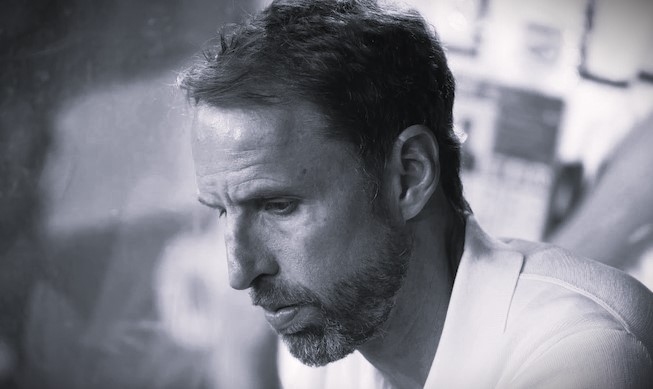Why Do England Struggle in Group Stages at Major Tournaments?
Posted on June 26, 2024
As a chez lounge supporter of the England football team, it’s both perplexing and, let’s be honest, occasionally bloody annoying to watch the squad’s recurring struggles against teams that the tabloids label as “minnows” during major tournaments. I have attempted to look what’s behind this phenomenon, whilst trying to keep my sense of moderate optimism intact (what else can we do when the football appears to be so lacklustre?).
Psychological Factors
Imagine playing football with a rucksack full of bricks on your back. That’s what it appears the England team does in every tournament during the group stages. The weight of expectation from fans and the media is like lugging around a double-decker bus. It’s no wonder the players sometimes buckle under the strain of it all. There’s also an old saying: “Never underestimate your opponent.” So maybe that needs to be printed on the walls of the England dressing room as a reminder (perhaps it is?).
Then the players might not start off thinking they’re in for an easy ride, only to find themselves knee-deep in footballing quicksand, wondering what on earth went wrong. Every England player knows the nightmare scenario: another embarrassing exit that will haunt their dreams and dominate the front and back pages (and social media). Instead of playing with flair and freedom, they turn into cautious robots, more afraid of making a mistake and being the next effigy outside a flat roof pub, than being creative.
Overrated Players and Fan Expectations
In England, a player excels at their domestic club and they become the next Lionel Messi overnight (see Jude Bellingham). The media loves a good hype train, and by Christ, do they like stoking those fires. By the time the tournament rolls around, we’re all convinced we have a squad of footballing demigods, only to face an inevitable reality check. England fans are a passionate (and sometimes brainless) bunch, but let’s be honest, they can also be more than a bit delusional, sticking on the rose tinted specs and reflecting back on the good old days when we were great (Except we weren’t). One day I will count the number of times England have been awful in group games. It will need to be a wet day with not much on Netflix, as it will take some time.
Despite multitudes of awful group games in the past, our optimism knows no bounds. We go into every tournament with dreams of glory, dismissing lesser-known teams as mere stepping stones, only to be brought back to earth with an obligatory thud. Yes, we have some very good players, but let’s be honest, there are many times when we’re outplayed by teams with better cohesion and tactics.
Football is a team sport, not a collection of solo acts. You can almost hear the collective gasp of surprise when some unheralded players from a country we couldn’t find on a map suddenly play like Messi against us. It sometimes feels like the Euros is an opportunity for an unknown player to get a bumper contract and nothing more than a burden for an established megastar with wads of cash and boxes full of club medals. I am certain there is some truth in that.
Disrespecting the Opposition
Assuming a routine victory can lead to cutting corners on preparation. Lesser-known teams? Surely, they don’t need as much analysis, do they? Just go out and beat them, they’re crap mate. Wrong. Every team at a major tournament is there for a reason (Scotland don’t yet know that reason, mind) and underestimating them is a recipe for disaster. For many lower ranked teams, playing against England is their World Cup final (See Slovenia last night).
They were ready to play the match of their lives while England were still figuring out how to get past their stout, organised defending. Their motivation levels were through the roof with qualification like winning the bloody thing. Some of their players were probably hanging posters of our players in their bedrooms a few years back, while our players are busy trying to remember whether they are are playing Slovenia, Slovakia or Serbia.
Possible Solutions
I assume England utilise sports psychologists? Players (some more than others) need help managing the insane pressure. A bit of mental resilience training might stop them from playing like headless chickens when the going gets tough. And how about we fans and the media adopt a touch of realism? Let’s dial down the expectation from “Win or Die” to “Let’s give it our best shot.”
It might just take the pressure off the players. Maybe coaches preparing for all opponents like they’re Brazil in disguise, would be an idea? Detailed game plans, respect for every team, and a bit more tactical adaptability could go a long way. More focus on developing technically sound players from the grassroots level, perhaps? Or following the lead of countries with strong technical programmes might just be the key to long-term success. I guess we’ve tried that but I don’t really know?
Conclusion
The England football team’s struggles against so-called lesser opposition at major tournaments appears to be a mix of psychological pressure, overinflated perceptions, and a lack of respect for opponents. By addressing these issues with a blend of seriousness and perhaps a bit of light hearted training and social time, England might just see more consistent and successful performances. Until then, how about we keep our sense of expectations intact and be more realistic. It would help ease the pressure, I think.
One thing is for sure. Pretending we are favourites never works and appears, if anything, to have the opposite effect.

Got something to say?